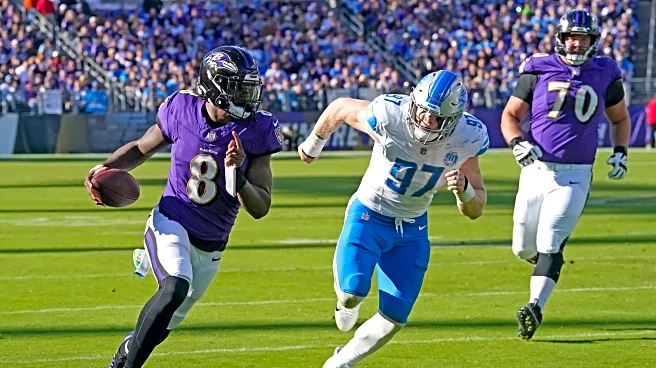With the Ravens hosting the Lions on Monday Night Football this week, Baltimore Beatdown asked Pride of Detroit what to expect from Dan Campbell’s squad. Here are their answers, courtesy of Senior Editor
Ryan Matthews. Also, check out our answers to their questions about the Ravens here!
- The Lions’ offseason was marked by significant departures from their coaching staff and starting lineup on both sides of the ball. Dan Campbell has prioritized building a strong culture that seems designed to withstand adversity, but Ben Johnson and Aaron Glenn were two of the best coordinators in the NFL. Before getting into the schematic and personnel differences from previous squads, what is the team’s mentality after so much turnover this offseason?
“Week 2 went a long way toward reinvigorating the belief and trust in this football team from the perspective of fans, but it’s hard to imagine the players or coaching staff were ever in doubt of that. Accountability is a foundational pillar Dan Campbell put in place when he became head coach in 2021. It’s been about counting on the guy lined up next to you to do their job, and that guy trusting you to do what’s expected of you as well, that’s where it all starts. A byproduct of accountability is trust, and this team–ownership, the front office, the players–they trust Dan Campbell.
And they trusted him when he chose to bring back John Morton, Detroit’s offensive assistant in 2022, to be the team’s offensive coordinator. Morton was integral in putting together the offensive system that since blazed its way to the top of the league, and after ironing out some of the communication errors that plagued them in their season opener against the Green Bay Packers, it looks like the offense is back to its old ways after hanging 52 on the Chicago Bears.
As for the other notable vacancy at defensive coordinator, the Lions hired from within, promoting long-time positional coach Kelvin Sheppard to be in charge of the defense. He spent years learning from his mentor Aaron Glenn, and it seemed like Sheppard taking over for Glenn as the team’s defensive coordinator had been the plan all along. Here’s Glenn from last December:
“He’s been there from the beginning, and he knows exactly how I think—exactly. And that’s a guy that I’ve been actually mentoring to be in the DC role at some point,” Glenn said. “I think he’s damn near close, if not there, to be ready to do that. He’s a damn good coach, he’s fiery. Everything that you need as a linebacker coach, he’s that, and there are certain coaches on the staff that I think have to be bulldogs, and he’s one of the those coaches at that position.”
So while there has been turnover, it’s marked by familiarity from people they’ve trusted in years prior. Their mentality remains focused on the ultimate goal of winning a Super Bowl for the first time in their franchise’s history.”
- The Lions replaced Johnson with John Morton, who spent the last two years in Denver under Sean Payton. Morton also served as an offensive assistant under Johnson in 2022. How much Payton influence is in John Morton’s offense, and what changes has he made to Johnson’s scheme? Johnson was also known for designing devastatingly effective trick plays. Does Morton have that same creativity, and should Ravens fans expect some trickery on Monday night?
“We haven’t seen any of the trickery that became synonymous with Ben Johnson’s “mad scientist” moniker during his time in Detroit, but we are seeing Morton leverage the embarrassment of riches he has in terms of talent to do damage–which we saw in abundance last week. In Week 1… not so much.
Against Green Bay, the miscommunication and missed assignments along the offensive line prevented Detroit from establishing the running game–a hallmark of Campbell’s teams since arriving in Detroit. The Packers’ Cover 2 and Cover 3 Buzz looks gave the Lions fits and really muddied up the middle of the field, a place where Jared Goff and the offense routinely make their hay.
As for the Payton influence, the offense is still very much predicated on West Coast style principles: a power run game, short and intermediate routes across the field, and a quarterback who is in complete command of what’s in front of him. What makes the Lions offense particularly effective is that aforementioned talent at the skill positions. Sam LaPorta is a dynamic athlete with his size and hands, but he’s also a force when he’s blocking in the ground game. Amon-Ra St. Brown has such a rapport with Goff and has such a keen understanding of where to find open space, he’s a perfect fit in this offense. Jameson Williams is a nightmare when he catches the ball with a head of steam across the field. The scheme is diverse and it really helps accentuate the strengths of the highly-skilled players it employs.
Who knows what’s up Morton’s sleeve at this point given we’re just two weeks into the season, but what is clear is his commitment to the run game and play-action passes–another strong suit of Goff. When both of those things are working, this offense can really pop off as it did a week ago. When Detroit can’t establish themselves at the line of scrimmage, when they can’t move people in the ground game and they struggle to keep Goff clean and on his mark in the pocket, it does make it hard for the offense to establish a rhythm–like it did in Week 1.”
- Detroit re-shuffled their offensive line this offseason after the departure of Kevin Zeitler and the retirement of Frank Ragnow. How has the new-look unit fared through two games, particularly against the stunts and simulated blitzes used by the Ravens?
“Week 1 was a disasterclass. It was equal parts Packers’ pass rush and poor communication on the Lions’ part that led to 13 pressures and 46 rushing yards on 22 carries. That was their worst rushing performance since Week 6 of 2023, when Jahmyr Gibbs was an injured inactive and David Montogmery was hurt and ruled out before halftime.
The following week, the Lions offensive line allowed just two pressures and they piled up 177 rushing yards on 30 carries. It really boiled down to communication and execution, but this week, it’s going to be a bit more challenging. If you’re an opposing defensive coordinator, you want to stress test that line’s ability to communicate. Baltimore is the home team, the Bank should be loud and lively, so it would be wise of Zach Orr to get a bit more aggressive on passing downs if the Ravens fare well against the run.
Graham Glasgow is getting his first full-time set of snaps at center since 2018–his last season in Detroit–so making him and Goff work a little harder at the line to figure out what’s real and what’s not should be something the Ravens and Orr lean into heavily. Especially since the rest of the Lions interior is relatively inexperienced at the NFL level: Christian Mahogany, LG, is going on his fifth start, and Tate Ratledge, RG, is just getting his third taste of NFL action.”
- The Ravens’ weakness thus far has been on the right side of their offensive line, where the strength of the Lions defense lies in Aidan Hutchinson. He was an early frontrunner for Defensive Player of the Year last year before a disappointing injury. Has he picked up where he left off, and if so, what can the Ravens do to slow him down?
“There was nothing more deflating than seeing Hutchinson get hurt in that game a little less than a year ago. Because you’re right, he was on pace to be the Defensive Player of the Year, and if not for that injury, the defense, the thing that ended up being the downfall for the Lions last season, wouldn’t have been.
Hutchinson looked a lot like himself in Week 1, and then he looked even more like himself in the follow up. He got his first sack of the season and through two games, he has seven pressures. Detroit could have reinforcements coming at the edge, but for now, he’s shouldering a heavy workload all things considered (103 snaps, 14th among edge defenders). The Lions will need him to be the gamewrecker he was shaping up to become last season–and that includes contributions on first and second down.”
- The Lions expressed no shortage of excitement about rookie wideout Isaac Teslaa this offseason. His two catches have been impressive, but how much of a factor will he be against the Ravens? What other offensive player poses the biggest threat to Baltimore’s defense?
“When they traded veteran receiver Tim Patrick, that was about as big a shock to me as anything else as the Lions got down to 53. TeSlaa was impressive during training camp, and his play in the preseason games continued to improve, but I couldn’t believe how confident the team was in him, especially to the point of making Patrick expendable.
He was mostly a big slot option in his lone season at Arkansas, but he surprised many when he showed himself to have a firm understanding and ability to play the X-receiver role as quickly as he did. His route tree was more polished, his hands and technique were incredibly sound and consistent, like catching the ball with his hands away from his body–this remains to be confirmed in the regular season since he doesn’t want to use both when he’s only needed one. The praise we heard of his physicality and relentlessness as a blocker downfield was evident, and that’s an easy way to endear yourself to this GM and head coach.
Earlier I touched on those pass-catchers the Lions will target often in this game, but let’s just make sure we cover all our bases and look at the running backs. One of the big takeaways from the first two games was that while the offensive line continues to gel, it will only help Detroit’s two talented backs. Not to say the Lions backs aren’t talented, but it’s very clear there’s still another level to how good this ground attack could be once all the pieces are rowing together.
Jahmyr Gibbs is taking on a bigger role this season, but David Montgomery is still very much key to this team’s success on offense. He’s valuable between the tackles and in short-yardage situations. As soon as Montgomery has worn down a defense, Gibbs’ athleticism can catch a defense sleeping. Keeping one another fresh is also so key to both of these guys being effective late into games, and that’s really the blueprint to Detroit’s success in the past: wear down an opponent for three quarters and lean on their ability to control the football because you just can’t keep up with their horses.”










